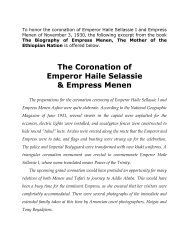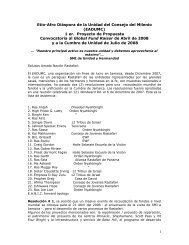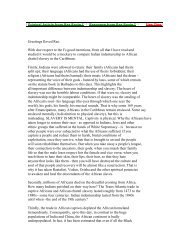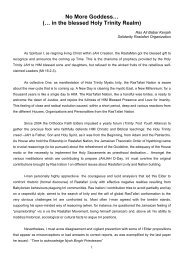DRAFT Universal Hair Exemption Letter TO: United ... - RasTa Ites
DRAFT Universal Hair Exemption Letter TO: United ... - RasTa Ites
DRAFT Universal Hair Exemption Letter TO: United ... - RasTa Ites
You also want an ePaper? Increase the reach of your titles
YUMPU automatically turns print PDFs into web optimized ePapers that Google loves.
cutting of cranial and/or facial hair. In a very few cases cranial haircutting is religiously<br />
directed, but facial hair removal is only rarely suggested, and the scriptural citations<br />
applying thereto offer only weak, tangential support for same. The academic, socialscience<br />
research is largely in accord in holding that bearded men are held in more<br />
positive regard than those with shaved faces. The view that the long haired male is<br />
unbowed is one that might be supposed to be as valued by modern day men as it was by<br />
the ancient Teutons and Celts. Many of the world's most commonly and highly revered<br />
religious human entities (including those respected as direct manifestations of God, as<br />
well those held to be bona fide prophets) are envisioned with unshorn hair. Many of our<br />
most highly respected men of non-religious, historical import are known to have been<br />
bearded and with relatively long hair. Yet today, the majority of our society's men shave<br />
daily and keep their cranial hair clipped short. In what theory do we find the<br />
reconciliation of these facts?<br />
Law officers and military men have long been associated with the personality traits of<br />
reliability and obedience as well as the appearance characteristics of scraped faces and<br />
short-clipped cranial hair. In the consequently proffered correlation, then, we find our<br />
first agent of reinforcement for the idea that short haired, bare faced men are good and<br />
proper. More significantly, though, the expectation of short hair and scraped faces on<br />
men has long since been the norm for this nation's employers in general. In holding the<br />
clipped male to be the preferred object of our workplace desire we show, not so much our<br />
disinterest in females in our society, but rather our particular interest in submissive men<br />
as producers of material benefit. We, as a society, prefer men in the workplace because<br />
we perceive men, as a class, to be more dedicated to employment activities to the<br />
detriment of their familial or other inter-personal relationships. (Rosenkrantz et al, 1968;<br />
Broverman et al, 1972) Further, we see them as being more dependable than females in<br />
that we expect them to be medically indisposed less often. But we also presume that men<br />
in general are domineering, willful and aggressive by nature, and these are clearly<br />
characteristics that are found to be dysfunctional in a production level employee. (Martin,<br />
1987; Rosenkrantz et al, 1968; Broverman et al, 1972) Women, on the other hand, are<br />
stereotypically presumed to be more docile, more amenable to following orders and<br />
accepting authority in an unquestioning manner. (Martin, 1987; Rosenkrantz et al, 1968;<br />
Broverman et al, 1972; Gilligan, 1982 at pgs. 16 & 17, e.g.)<br />
The clipped male seems to present the best of both genders in that, first, he is obviously a<br />
man and so brings to the employer the supposed dependability and dedication that we<br />
expect of a member of the male sex. Second, by scraping off his facial hair he<br />
communicates to the employer that he intends to be as docile and obedient as would a<br />
female be presumed to be. (The validity of this hypothesis is lent support by so many of<br />
today's business women inasmuch as they are careful to appear for job interviews in<br />
clothing that is masculine on top, shirt-like blouse and suit jacket, but feminine on the<br />
bottom with a skirt short enough to expose artificially hairless legs.) The cutting short of<br />
cranial hair is a further sign of male submission to, and emasculation before, the<br />
prospective employer; one needn't be a Freudian psychoanalyst to appreciate the import<br />
of the fact that the removal of cranial hair, as symbolic penectomy, has never been<br />
required of women by our society's employers, prison wardens, or military authorities.
















